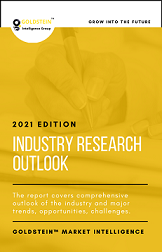[email protected]
| We established a quick response research team to monitor the impacts of global pandemic COVID19 on this market to keep our clients informed about latest data and changing strategies. The report will incorporate these insight and data factors. | × |
|---|
COVID-19 Impact Analysis
Understand the COVID-19 Outbreak and its impact on global & regional businesses
request free proposalCOVID-19 Insights
Insights on a world turned upside down : Re-imagining
The post-COVID19 Business resilience & recovery
Strategy Time
How effective strategies and business recovery plans are winning the race
request free proposalResponding to COVID-19
Goldstein Market Intelligence help you navigate through the COVID-19 crisis,
we will provide you most relevant market insights on crisis management,
recovery strategy & business continuity.

Global Biosimilars Industry Analysis: Market Insights, Risk Analysis, Y-O-Y Growth Rate, Manufacturers, Size, Market Segmentation Based on Product Type, Based on Implications, Based on Manufacturing & by Region with Forecast 2017-2030
2020-03-04
728
Global
Biosimilars Market in the Global Industry Landscape
Biosimilars are like generic drugs, as such they intend to replace biologics in the market. Unlike original brand drug which are made of chemical substances, biologics are made from living organisms. The FDA approval process for biosimilars is much complex than generic drugs. Though biologics are made from living organisms, but the biosimilars uses the nearby compounds used in biologics. Therefore the result of biosimilar might vary with their biologics and thus are difficult to get approved. But biosimilars are low cost and have better response on the diseases as compared to other drugs.
Further, biosimilars in Europe has achieved most advanced and developed position across the world. European biosimilar market (EMA) has approved 16 biosimilars till 2017. As per European Commission (EC), 19 biosimilar therapeutic medicines are approved for marketing and in total 40 biosimilars across different categories have been approved by EC till March 2018. In 2017, Roche Herceptin has achieved USD 2.0 billion sales across Europe, demonstrating attractive opportunities in biosimilars industry.
Global Biosimilars Market Segmentation
Based on Product Type
-
Recombinant Non-Glycosylated Proteins
- Insulin
- Human Growth Hormone
- Granulocyte Colony-stimulating Factor (G-CSF)
- Interferons
- Recombinant Glycosylated Proteins
- Erythropoietin
- Monoclonal Antibodies
- Follitropin
- Recombinant Peptides
- Glucagon
- Calcitonin
Based on Implications
- Oncology
- Nephrology
- Autoimmune Disorders
- Infectious Diseases
- Others
Based on Manufacturing
- In-House Manufacturing
- Contract Manufacturing
Based on Geography
- North America (U.S. & Canada) Biosimilars Market {Market Share (%), Market Size (USD Billion)}
- Latin America (Brazil, Mexico, Argentina & Rest Of Latin America) Biosimilars Market {Market Share (%), Market Size (USD Billion)}
- Europe (The U.K., Germany, France, Italy, Hungary, Spain, Poland, Sweden & Roe) Biosimilars Market {Market Share (%), Market Size (USD Billion)}
- Asia-Pacific (China, India, Japan, Singapore, South Korea, Australia, New Zealand, Rest Of Asia) Biosimilars Market {Market Share (%), Market Size (USD Billion)}
- Middle East & Africa (GCC, South Africa, North Africa, Romea) Biosimilars Market {Market Share (%), Market Size (USD Billion)}
Global Biosimilars Market Outlook comprises of the following data:
- Biosimilars market size and market compounded annual growth rate, 2017-2030
- Marketed biosimilars sales and revenue, by region, 2017-18
- Biosimilars approval scenario, 2017-18
- Number of Oncology cases and growth rate of oncology cases, 2017-18
In 2017 on the basis of implications, biosimilars for oncology segment accounted for largest market share in the global biosimilars market. Most of the biosimilars currently available or under research are to treat one or other type of cancer, such as rituximab biosimilars Truxima (Mundipharma and Celltrion) and Rixathon (Sandoz) are available for the treatment of non-Hodgkin lymphoma (NHL) and chronic lymphocytic leukemia (CLL), the first monoclonal antibody biosimilars which was approved in 2017 in Europe.
AbbVie’s Humira (adalimumab) patent, a biologic to treat moderate-to-severe Crohn’s disease (CD), is set to expire in 2020 in US including the manufacturing methods and drug formulation (though expired in 2016), and in Europe it is to expire in December 2018. This will pose competition to AbbVie from the biosimilars. Humira (adalimumab) biosimilar Amjevita by Amgen was approved by both EC and FDA in March 2017 and September 2016 respectively. But the legal dispute between AbbVie and Amgen has led to pause the manufacturing and sales of biosimilar by Amgen till 2023. This though reflects the struggle of biosimilars in the market in terms of both the approval process and marketing process.
Competition Analysis: Biosimilars have changed the landscape of competition in the pharmaceutical industry. The branded drug manufacturers and pharmaceuticals as seen till now were in competition with the generic drug manufacturers. Whereas, now the branded drug manufacturers are likely to shift their interest towards biosimilars. Moreover, the low profit margin in the manufacturing and marketing of biosimilars has led the companies are pursuing the pharmacists and doctors advocating quick and effective response of biosimilars than the other drugs.
A complementary 2hrs free facility through which report buyers can interact with our pool of experienced analysts for any report related queries, clarifications or additional data requirements
OR Call Us:+1-646-568-7747Table of Contents
BROWSE SIMILAR REPORTS
-
Global Point of Care Testing (POCT) Devices Market Outlook 2024: Global Opportunity , Market Segmentation By Systems Basis, By Clinical Specialties & Diseases, By Areas of Use, By End User & by Region with Forecast 2017-2030
-
Global Home Healthcare Equipment Market Size , Share, By Device, By Distribution Channel, By End User & by Region with Forecast 2017-2030
-
Global Connected Healthcare Market Analysis by type, by function & by application with regional outlook and forecast to 2030
-
India In-Vitro Diagnostics (IVD) Market Outlook 2024, Global Opportunity and Demand Analysis, Market Forecast, 2016-2024
-
Global Connected Medical Device Market Outlook 2024, Global Opportunity and Demand Analysis, Market Forecast, 2016-2024
